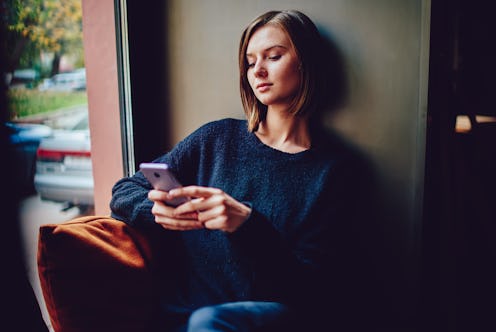(Living)
Breaking Up While Social Distancing — How To Do It Right

When it comes to romantic relationships, things can be tricky when you're self-isolating. Living with your partner presents its own share of struggles during this stressful time, but what happens when you find the relationship strained and you can't be face-to-face to talk about it? If in fact you think breaking up while social distancing is the best for both of you, experts say it can — and probably should — be done, but there are ways to make it a less painful process.
Read more: Should You Break Up With Someone Because Of Their Family?
Some couples find themselves clinging to one another in the midst of a traumatic time, even if they know they're not getting what the ultimately want out of the relationship. You might believe that being single would be worse than whatever issues the two of you are having, but therapists say you're not doing each other any favors by sticking together if the relationship's just not working. "It is important to note that this time is hard for even the strongest relationships," says Tina Setteducate, a therapist and co-author of upcoming breakup book Breakup & Breakout. "However, if your partner seems completely unwilling or unable to support you, show up, or have hard conversations during this time, it may be time to reflect on how this effects you. It is in tough times like these where relationships are tested and when we have the opportunity to see how our partner can show up — or not."
Breaking up with someone is objectively never easy to do (on either side) and when you can't be close because of social distancing, it seems especially tricky. But there are ways to handle this daunting task with thoughtfulness and respect, so that neither of you ends up feeling like you're stranded without support.
"There may be the feedback that it is especially 'mean' or 'insensitive' to end a relationship during this time," says Setteducate. "With this in mind, it is also very hard to stay in a relationship that you are not happy in for an undetermined amount of time. Having compassion for your partner but also honoring yourself if you are unhappy in a relationship during this time is equally important."
Not quite sure if you're ready to cut the cord? Setteducate's Breakup & Breakout's partner and fellow Playa Vista Counseling therapist Rachel Thomasian believes there are a few signs to look for. "It can be very telling how someone reacts in crisis," she explains. "Do they ensure you feel safe, secure, and loved, or are they constantly complaining about their own needs being unmet and how unfair life is? I've noticed some people who are completely disregarding their partner's and family's safety by ignoring stay-at-home orders and hanging out with friends. It's looking like the quarantine is just intensifying people's existing characteristics, and we decide what we can ignore and what we can live with." That said, if your partner just doesn't seem to be showing up, and giving the support up need, it's probably time to end things. And while doing so while not being able to be face-to-face is tough, Thomasian and Setteducate have a few pointers to make it as smooth a transition as possible.
Don't Come Out Of Left Field
If the two of you have been struggling, ideally you've had conversations about what you need and want leading up to this time. If not, that should be your first step. "Try not to blindside them; have a few conversations about how your needs are not being met or how unhappy you are before you pull the rug out from under them," says Thomasian.
Try for Some Face Time (Virtually)
Breaking up when you can't make eye contact with the person can feel especially harsh or cold. So if you can, opt for a video call, which may seem more personal. "Although this isn't the same as connecting in person, it still gives both people the opportunity to see each other's facial expressions and body language," Setteducate explains.
Plan To Follow Up In Person — When Possible
"Let them know you are willing to connect in person when quarantine is over," Setteducate suggests. "It can be helpful to let them know that you are open and willing to talk more in person once you are able. That may give you both the sense that some closure can be gained at some point, even if it feels especially harder to get now."
Encourage Them To Use Their Support System
"Especially now, consider their support system and try to make sure they have some healthy coping skills," offers Thomasian. "This is not entirely your responsibility, but it's helpful if they have another friend to talk to."